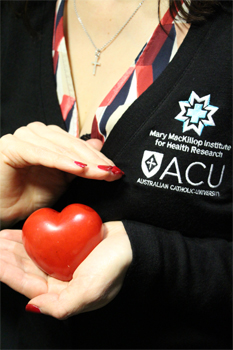Cardiovascular Disease: the $3bn 'Hidden Killer' of Australian Women

Cardiovascular Disease: the $3bn -Hidden Killer' of Australian Women
New research from the Mary Mackillop Institute for Health Research at ACU has revealed that when its wider contribution to not just heart attacks and strokes are considered, cardiovascular disease is the number one killer of Australian women, with the -hidden' diseases causing more fatalities than the most common forms of cancer (including breast cancer) and costing the health system $3 billion annually.
The Hidden Hearts: Cardiovascular Risk and Disease in Australian Women report finds cardiovascular disease (CVD) (which includes acute heart attack), and associated diseases such as diabetes and kidney failure contribute to at least 31,000 deaths of Australian women every year – significantly more than the 12,000 deaths attributed to the most common forms of cancer.
Alarmingly, more than 3000 Australian women each year will suffer a sudden and fatal cardiac event without ever reaching a hospital.
Of those fortunate enough to receive hospital treatment, more than a third admitted for the first time with heart failure and stroke die within 12 months. One in nine women admitted to hospital for the first time with coronary artery disease (CAD – the leading cause of CVD deaths) die within 28 days.
Professor Simon Stewart, principal investigator behind the Hidden Hearts report, says that despite the high prevalence of CVD in women 35 years and over, low awareness of the risks means that many women ignore the warning signs before suffering a potentially fatal and disabling cardiovascular event.
'The large majority of Australian women are still under the impression that heart disease and stroke are male diseases. This is simply not true and without urgent education, more Australian women are at risk of falling victim to this killer, particularly with their current, high cardiovascular-risk lifestyles.
'Increased obesity rates mean that all forms of CVD are becoming increasingly common in younger women; and with nearly one in three Australian women aged 18 and over considered insufficiently active, and one in five reporting no exercise at all, the likelihood of these young women developing CVD in the longer-term is frighteningly high."
Poor representation of women in clinical trials of new therapies, and resulting male-centric treatment, presents a significant barrier to effective management and prevention of CVD in women. Following diagnosis, women with CVD are also less likely than men to attend cardiac rehabilitation, despite often exhibiting worse quality of life and more instances of depression than men.
'The fact of the matter is that CVD and its consequences are highly preventable. These are avoidable diseases with extraordinary personal and financial burdens," says Professor Stewart.
'With $3 billion spent on CVD-related hospital care for women every year, it's vital that the public health system stops being complacent, and prioritises this critical health issue. The Hidden Hearts report recommends a serious investment in awareness campaigns, gender-specific guidelines and prevention programs, and targeted research to combat the current and future burden of CVD among Australian women.
'Australia already lags behind other comparable countries such as New Zealand in terms of accessing accurate data about CVD, and thereby identifying key response measures."
'It's imperative that our governments and health authorities implement a dedicated response, and ensure these unnecessary deaths are prevented."
Hidden Hearts, Cardiovascular Risk and Disease in Australian Women was officially released and presented by Professor Maja-Lisa Løchen at the Cardiovascular Risk and Disease in Australian Women Summit, held today (11 October 2016) at Parliament House in Canberra to members of Parliament – including Health Minister, Hon Sussan Ley, representing the Prime Minister, Shadow Health Minister, Hon Catherine King and Leader of the Greens and Health Spokesperson, Senator Richard Di Natale – and over 50 national health experts, who considered the report's findings and recommendations.
MORE



